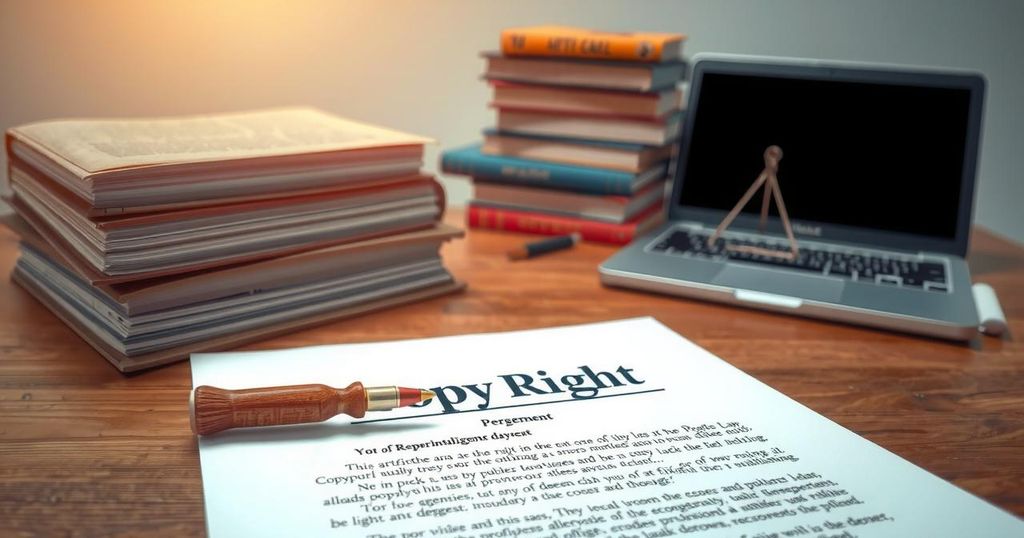Publishers Seek Legal Protections Against AI Utilizing Their Content
Major publishers are pushing for increased legal protections against AI systems that use their content without permission or payment. This is in response to the growing threat to their business models as AI-generated content competes with their works. Legal action has begun, targeting AI developers, and calls for legislation and technical solutions are gaining momentum to safeguard intellectual property rights.
In a rapidly evolving landscape of technology and creativity, major publishing houses are urgently calling for enhanced legal protections against artificial intelligence (AI) that utilizes their content without seeking permission or offering compensation. This growing friction comes amid concerns that AI companies are harnessing vast troves of published material to train their models, often sidestepping consent from the original creators.
The publishing sector, already grappling with significant economic pressures in this digital age, now faces what industry insiders describe as an existential threat. AI technologies that generate content leveraging their intellectual property are raising alarms. “Our authors and publishing houses invest significant resources to create original works. When AI systems absorb and repurpose this content without compensation, they’re essentially building commercial products on the back of our intellectual property,” noted a representative from the industry.
What’s at stake? Well, it revolves around how these AI models are crafted and brought to life. Large language models require colossal datasets to learn effectively, and publications like books and articles offer some of the best quality material to nourish this training. Publishers assert that using their content without proper clearance constitutes nothing less than copyright infringement.
In response, several major publishing players have started filing lawsuits against notable AI developers. These legal actions could potentially set important precedents regarding the application of copyright laws in the age of AI training data. The stakes are high, and the implications could resonate across various sectors.
AI’s looming presence in the publishing realm threatens to disrupt their business model in multiple ways. First, AI-generated content could increasingly rival human-authored works. Second, there’s the risk of diminished revenue from licensing as AI systems utilize content without compensating creators. Reports indicate that the financial health of the publishing industry is already precarious, with slim margins making it particularly susceptible to disruption.
To counteract these threats, publishers are proposing a range of solutions. Many are championing legislation that would explicitly compel AI companies to secure licenses for training data usage. Others put forth technical solutions that would allow content owners the opportunity to opt out of being included in AI training datasets. One publishing executive stated, “We’re not against innovation. We simply want fair compensation when our intellectual property is used to build commercial AI products.”
In an encouraging sign, some AI companies have begun to explore negotiation channels with select publishers, potentially paving the way for future cooperation. These licenses are expected to provide monetary compensation and set strict boundaries regarding how the AI can deploy or replicate licensed works.
It’s essential to note that the concerns raised by publishers touch upon a much broader dialogue regarding AI’s influence in creative spheres. Sectors like music and art are similarly voicing issues about unauthorized use of their works for AI training purposes. Legal experts are quick to point out that the existing copyright laws weren’t tailored to address the nuances brought about by AI, leading to obscure outcomes in court decisions. Some posit that the training of AI could fall under “fair use,” while others argue for clear licensing requirements for commercial AI endeavors.
Of course, a cautious balance must be struck. Overly stringent regulations could potentially stifle innovation in the AI landscape. As these legal skirmishes play out, the decisions made now could shape not only the future of the publishing industry but will also influence the trajectory of AI in creative pursuits. For publishers, the final rulings could clarify whether they’re looking at AI as a helpful ally or a fierce competitor in the contest of creating and sharing written content.
The ongoing battle between publishers and AI developers highlights a pressing need for legal frameworks around intellectual property in the context of AI technologies. With publishers advocating for clearer licensing requirements and protections for their content, the outcome of these disputes will shape the future landscape of both the publishing industry and AI development. Balancing creator rights with technological innovation remains a critical challenge as the industry navigates through these turbulent waters.
Original Source: www.entrepreneur.com




Post Comment